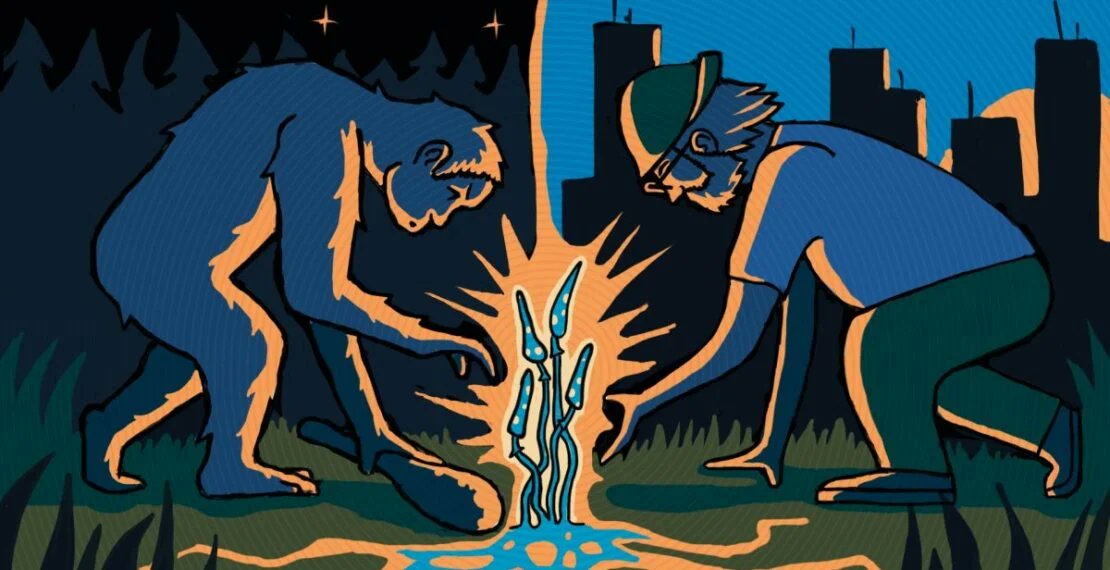Groundbreaking research shows how psilocybin reshapes brain networks, offering rapid and sustained relief from depression 🧠
This study analyzed psilocybin vs. traditional antidepressants in two clinical trials with promising results.
Let’s dive in 🧵
This study analyzed psilocybin vs. traditional antidepressants in two clinical trials with promising results.
Let’s dive in 🧵

Psilocybin therapy reduced brain modularity—essentially increasing communication across the brain’s major networks.
This shift was linked to significant reductions in depression symptoms lasting up to 6 months.
This shift was linked to significant reductions in depression symptoms lasting up to 6 months.

The first trial was an open-label study with treatment-resistant depression (TRD) patients.
They showed a 21-point drop in depression scores just one week after therapy—an impact that remained evident 6 months later.
They showed a 21-point drop in depression scores just one week after therapy—an impact that remained evident 6 months later.
The second trial was a double-blind, randomized controlled trial comparing psilocybin with escitalopram, a conventional SSRI antidepressant.
Psilocybin led to a greater decrease in depression symptoms and brain modularity than escitalopram.
Psilocybin led to a greater decrease in depression symptoms and brain modularity than escitalopram.

The research suggests that psilocybin’s effect on the brain is unique.
It promotes global brain integration, reducing rigid and isolated brain networks often seen in depression, especially in the Default Mode Network (DMN).
It promotes global brain integration, reducing rigid and isolated brain networks often seen in depression, especially in the Default Mode Network (DMN).
Why the DMN?
It’s the brain’s “self-referential” network, often hyperactive in depression.
Psilocybin dampens this network, allowing other networks, like the executive and salience networks, to step in and improve mental flexibility.
It’s the brain’s “self-referential” network, often hyperactive in depression.
Psilocybin dampens this network, allowing other networks, like the executive and salience networks, to step in and improve mental flexibility.

Brain scans taken just one day after psilocybin therapy revealed reduced modularity, reflecting a more integrated brain state.
This change predicted long-term improvements in depression symptoms.
This change predicted long-term improvements in depression symptoms.
Unlike traditional SSRIs, which can take weeks to show effects, psilocybin’s impact was rapid and enduring.
Researchers noted this rapid integration of brain networks could explain the lasting antidepressant effect of psychedelics.
Researchers noted this rapid integration of brain networks could explain the lasting antidepressant effect of psychedelics.

Interestingly, brain “network flexibility” was also improved after psilocybin therapy.
Increased flexibility in brain regions associated with learning and attention correlated strongly with improved mood.
Increased flexibility in brain regions associated with learning and attention correlated strongly with improved mood.
The findings reinforce the potential of psilocybin as a transformative therapy for depression, especially for those unresponsive to standard treatments.
The unique neural effects may offer new hope for future therapies.
The unique neural effects may offer new hope for future therapies.
As the conversation around psychedelics in mental health grows, this research points to a promising, science-backed role for psilocybin.
A deeper understanding of brain modularity and network flexibility is key.
A deeper understanding of brain modularity and network flexibility is key.
• • •
Missing some Tweet in this thread? You can try to
force a refresh





